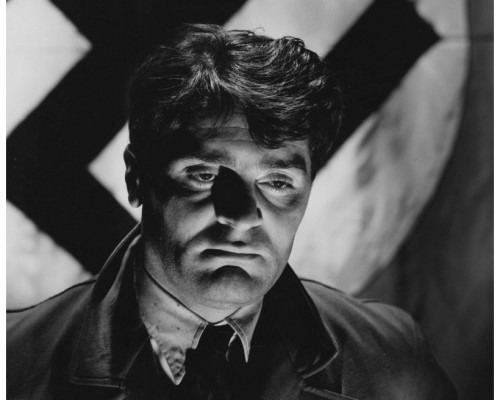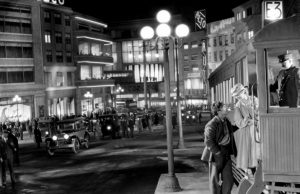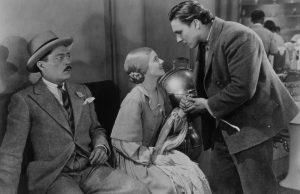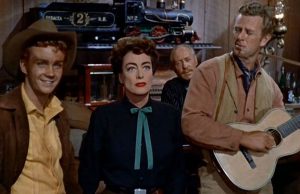Confessions of a Nazi Spy (1939)

Toronto Film Society presented Confessions of a Nazi Spy (1939) on Monday, April 2, 1979 in a double bill with The Search as part of the Season 31 Monday Evening Film Buff Series, Programme 9.
Production Company: Warner Brothers. Producer: Hal B. Wallis. Director: Anatole Litvak. Screenplay: Milton Krims and John Wexley, baed on materials gathered by leon G. Turrou, former FBI agent. Photography: Sol Polito.
Cast: Edward G. Robinson (Ed Renard), Francis Lederer (Schneider), George Sanders (Schlager), Paul Lukas (Dr. Kassel), Henry O’Neill (D.A. Kellogg), Lya Lys (Erika Wolff), Grace Stafford (Mrs. Schneider), James Stephenson (Scotland Yard Man), Sig Rumann (Krogman), Fred Tozere (Phillips), Dorothy Tree (Hilda), Celia Sibelius (Mrs. Kassel), Joe Sawyer (Renz), Lionel Royce (Hintze), Hans von Twardowsky (Wildebrandt), Henry Victor (Helldorf), Frederick Vogeding (Captain Richter), George Rosener (Klauber), Robert Davis (Straubel), John Voigt (Westphal), Willy Kaufman (Gruetzwald), William Vaughn [Von Bricken] (Captain Von Eichen), Jack Mower (McDonald), Robert Emmett Keane (Harrison), Eily Malyon (Mrs. MacLaughlin), Frank Mayo (Staunton), Alec Craig (Postman), Jean Brook (Kassel’s Nurse), Lucien Prival (Kranz), Niccolai Yoshkin (A Man), Bodil Rosing (Anna), Charles Sherlock (Young), Frederick Burton (U.S. District Court Judge), John Deering (Narrator), Ward Bond (America Legionnaire), Martin Kosleck (Goebbels).
As the 1930s raced towards a shattering conclusion, Hollywood for the most part was ignoring the rapidly deteriorating international situation. This, basically mirrored the general desire of the American public, preoccupied with Depression problems, to remain isolated from the faraway troubles of Europe.
Thus, Confessions of a Nazi Spy burst upon the scene with explosive force when it was released in April, 1939. The subject matter, an exposé of German espionage and activities in the U.S., was so controversial that the studio received numerous threats, as did star Edward G. Robinson.
Small wonder, for Confessions was based on fact, the 1938 arrest and trials of espionage agents of the Third Reich. It was the first American film to take a determined, uncompromising anti-Nazi stance.
It is no surprise that the film was produced by Warner Brothers, for the Burbank studio, from 1930’s Little Caesar (also, co-incidentally, starring Edward G. Robinson) had never hesitated to film topical and often inflammatory subjects, such as I Was A Fugitive From a Chain Gang and They Won’t Forget (a searing attack on political opportunism which resulted in a lynching).
Warners’ style–dramatic, high-key photography, rapid pacing, and stirring musical scores was, of course, ideally suited for such productions. For Confessions a new technique was tried–the semi-documentary. Actual newsreel footage of German-American Bund rallies in New York and New Jersey, spoken commentary, maps, and some location shooting were effectively used to heighten the picture’s atmosphere of authenticity and timeliness.
A brisk narrative pace is followed, from the activities of Gestapo agents on board German liners and i the Teutonic beer-houses of New York to the Bund summer camps, where young American boys of German descent heil Hitler and young girls recite their maternal duties to the State.
As the FBI investigator, Edward G. Robinson was playing one of his first sympathetic roles, and one which he had fought for (a willingness to do so seemed to be a prerequisite of getting anywhere at Warners).
Hungarian-born Paul Lukas, a low-key, superbly professional actor, was, as always, excellent, as the fanatical doctor at the head of the Bund. So, too, was British-raised George Sanders, with his faultless diction, so characteristic of English actors, and his pateneted manner of arrogance and ruthlessness.
Francis Lederer was probably chosen for his role because of his European background (Czechoslovakia). As a man driven by an over-riding ego, who proves to be the one weak link in the spy chain, the image of Lederer’s trapped and stuffy face is not easily forgotten.
Although told in melodramatic fashion, Confessions benefits from an absorbing story, effective scenes, and, most important, good pacing–characteristics too often absent from today’s films.
Notes by John Thompson














Leave a Reply